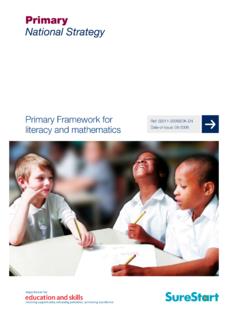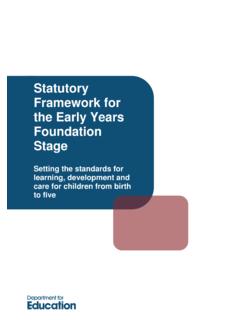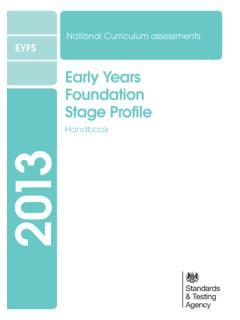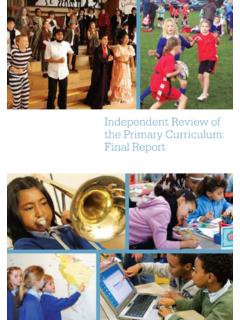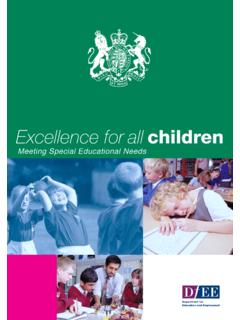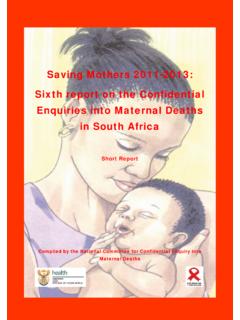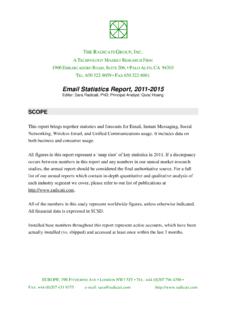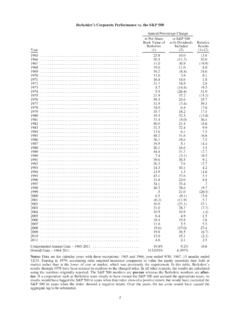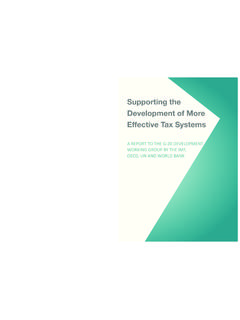Transcription of Review of Key Stage 2 testing, assessment and ...
1 Independent Review of Key Stage 2 testing , assessment and accountability Final report Lord Bew June 2011 . 2. Contents 3. Remit of the Review into Key Stage 2 testing , assessment and accountability .. 4. Membership of the Review Panel .. 5. Outline of the evidence-gathering 5. Foreword by Lord Bew .. 6. Executive Summary .. 9. Key principles which underpin our recommendations .. 9. Chapter 1 Purposes of Statutory assessment .. 17. Chapter 2 accountability .. 21. The impact of school accountability .. 21. Concerns over the school accountability system .. 22. Increased focus on 25. Ensuring a focus on the progress of all 25. Key Stage 1: baseline to measure progress .. 27. Ofsted 29. Broader accountability 31. Rolling averages .. 32. Pupil mobility .. 33. School-level measures in reading and 33. Additional measures and contextual 34. Allowing absent pupils to take tests within a given time 34. The publication of summative teacher assessment 35.
2 Reporting to 37. Reporting pupil-level results to parents and secondary schools .. 38. Parental surveys .. 39. National Curriculum levels .. 39. Enabling benchmarking of schools .. 41. International comparison studies .. 42. Chapter 3 Statutory assessment .. 43. History of statutory assessment .. 43. Perceptions of current statutory assessment .. 45. The purposes of statutory assessment .. 46. Summative teacher assessment and school 48. Reliability of summative teacher assessment .. 49. Moderation and summative teacher 50. Summative teacher assessment in Wales .. 51. Summative teacher assessment conclusions .. 53. Key Stage 2 National Curriculum Tests .. 54. Reliability and validity of National Curriculum 54. Using National Curriculum Tests to measure standards over time .. 55. External marking .. 56. Recommended reforms to statutory 58. 58. Writing .. 59. Speaking and listening .. 62. Mathematics .. 62. Science .. 64. Coherence between statutory assessment and the new National Curriculum.
3 66. Chapter 4 Delivery of testing and assessment arrangements .. 67. Cluster moderation to support professional development .. 67. Transition to secondary school .. 68. Timing of tests .. 69. On-screen 71. Potential long-term changes .. 73. Computer-administered testing .. 73. Computer adaptive testing .. 74. testing when ready .. 74. Annex Stakeholders who have submitted evidence to the 77. 3. Remit of the Review into Key Stage 2 testing , assessment and accountability This Review has been framed by a particular remit. It may be helpful to begin by revisiting our remit so that we can be clear about what is in our scope. There are two broad positions to which the Secretary of State has asked us to adhere throughout. Firstly, the Government is mindful that the Organisation for Economic Cooperation and Development (OECD) concludes that external accountability is a key driver of improvement in education and particularly important for the least advantaged.
4 It therefore views a system of objectively measuring pupil progress and holding schools to account as vital. Secondly, the Government has made it clear that it wants schools and teachers to be free to set their own direction, trusted to exercise their professional discretion and accountable for the progress of the children in their care. The Secretary of State has therefore been clear that school autonomy must be accompanied by robust accountability . Within those parameters, this Review was asked to address the following key issues: how best to ensure that the system of assessment in primary schools can improve standards of attainment and progress of pupils, and help narrow gaps;. how best to ensure that schools are properly and fairly accountable to pupils, parents and the taxpayer for the achievement and progress of every child, on the basis of objective and accurate assessments; and that this reflects the true performance of the school.
5 How to avoid, as far as possible, the risk of perverse incentives, over-rehearsal and reduced focus on productive learning;. how to ensure that parents have good quality information on the progress of their children and the success of schools;. how to ensure that performance information is used and interpreted appropriately within the accountability system by other agencies, increasing transparency and preserving accountability to parents, pupils and the taxpayer, while avoiding the risk of crude and narrow judgements being made;. how to ensure that tests are rigorous, and as valid and reliable as possible, within an overall system of assessment (including teacher assessment ) which provides the best possible picture of every child's progress;. how best to ensure that the assessment system allows us to make comparisons with education systems internationally;. how to make administration of the system as simple and cost-effective as possible, with minimal bureaucracy.
6 4. Membership of the Review Panel Lord Bew is a cross-bench peer, Professor of Irish Politics at Queen's University in Belfast, and a Member of the Royal Irish Academy. He was a historical adviser to the Saville Inquiry from 1998 to 2001. Membership of the panel in full is: Lord Bew Chair. Helen Clegg OBE Executive Head teacher, Shiremoor Primary School in North Tyneside. National Leader of Education. Sally Coates Principal, Burlington Danes Academy in West London. Kate Dethridge Head teacher, Churchend Primary School in Reading. National Leader of Education. Lubna Khan Head teacher, Berrymede Junior School in Ealing. Local Leader of Education. Ruth Miskin Founder, Read-Write Inc. and former primary head teacher. Miriam Rosen Former Executive Director, Ofsted. Tim Sherriff Head teacher, Westfield Community School in Wigan. Local Leader of Education. Greg Wallace Executive Principal of Best Start Federation in Hackney. National Leader of Education.
7 Representatives of Ofsted and Ofqual act as observers. Outline of the evidence-gathering process Given the scale and complexity of this Review , we endeavoured to gather as much evidence and feedback as possible in an open, transparent and outward-facing way. A 12-week call for evidence invited all interested parties to contribute. As a result we have received around 4,000 online responses, taken oral evidence from 50. stakeholders, and many written submissions have been sent in. A list of stakeholders is included at the end of this report . In early April we published our Progress report , which outlined the range of evidence and opinion received by the Review . In particular, it outlined the main views we heard through oral evidence sessions and written submissions. It did not attempt to draw conclusions or make recommendations, which is the task of this Final report . We have also published a Call for Evidence report , which summarises the main findings from the nearly 4,000 respondents to the Review 's call for evidence.
8 This Final report discusses the evidence, including the published research material we have considered, outlines the conclusions we have reached and sets out our recommendations. 5. Foreword by Lord Bew The system of testing , assessment and accountability at the end of Key Stage 2 has a profound impact on primary school education. It is crucial for pupils, parents, teachers, head teachers and the nation as a whole that the system works effectively and is fair for all involved. Given the scale of the challenge and the importance of getting Key Stage 2 testing , assessment and accountability right, the Secretary of State asked us seven months ago to conduct an independent Review of the system and to set out our recommendations for how it can be improved. We are grateful to everyone who has contributed to the Review . We very much appreciate the 4,000 responses to the online call for evidence, the evidence from 50. stakeholders who have spoken to us in formal sessions, and the many written submissions we have received.
9 We are fortunate that this Review has generated an immense amount of evidence and feedback in this area, which we have been careful to take into account fully. It has been a real privilege to hear from so many colleagues who are so passionately committed to improving the current system. We are grateful for the open and constructive way in which so many people have explained their views and presented evidence and feedback. There is clearly much about primary school education in this country that we should celebrate and of which we should be proud. To take just one example, the attainment gap between pupils known to be eligible for free school meals and their peers, while still too large, has fallen by 7 percentage points in English and 6 percentage points in mathematics between 2002 and 2010. We have been particularly impressed by the outstanding commitment of teachers and head teachers across the country about whom we have heard during the Review .
10 We understand how hard they are working, often in very challenging contexts, to give children in their care the best possible education. However, in relation to the area of primary school education which falls within our remit Key Stage 2 testing , assessment and accountability significant concerns have frequently been raised. Many of those who gave evidence have highlighted positive aspects of the current system and said that they should be retained; many other respondents have argued that parts of the system are unhelpful, and at worst a barrier to teaching and learning. The strength of feeling associated with these concerns shows that some change is clearly needed. A commitment to standards should not, in principle, be at the expense of creativity. The range of opinion in this area has been striking. It is inevitable, given the strength of feeling and the wide range of views, that much of the evidence and feedback is conflicting or contradictory.


